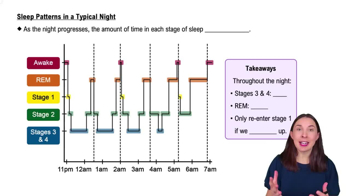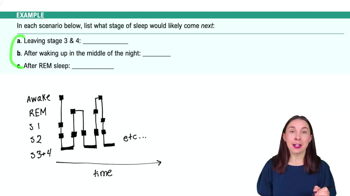Table of contents
- 1. Introduction to Psychology1h 43m
- 2. Psychology Research2h 20m
- 3. Biological Psychology2h 41m
- 4. Sensation and Perception28m
- 5. Consciousness and Sleep32m
- 6. Learning41m
- 7. Memory34m
- 8. Cognition37m
- 9. Emotion and Motivation35m
- 10. Developmental Psychology33m
- 11. Personality48m
- 12. Social Psychology41m
- 13. Stress and Health41m
- 14. Psychological Disorders44m
- 15. Treatment47m
5. Consciousness and Sleep
Sleep
Struggling with Psychology?
Join thousands of students who trust us to help them ace their exams!Watch the first videoMultiple Choice
While in the middle of a conversation with his co-worker, Jackson unexpectedly slipped into a state of sleep, falling to the floor as he lost control of all the muscles in his body. Jackson appears to have a condition called
A
narcolepsy.
B
sleep apnea.
C
somnambulism.
D
enuresis.
 Verified step by step guidance
Verified step by step guidance1
Identify the symptoms described in the scenario: Jackson unexpectedly falls asleep and loses muscle control during a conversation.
Understand the key characteristics of narcolepsy: It involves sudden sleep attacks and can include cataplexy, which is a sudden loss of muscle tone.
Differentiate narcolepsy from other sleep disorders: Sleep apnea involves breathing interruptions during sleep, somnambulism is sleepwalking, and enuresis is bedwetting.
Recognize that the sudden onset of sleep and muscle control loss aligns with narcolepsy, particularly with the symptom of cataplexy.
Conclude that the condition described is most consistent with narcolepsy, given the specific symptoms of sudden sleep and muscle control loss.

 3:25m
3:25mWatch next
Master Circadian Rhythms with a bite sized video explanation from Hannah Gordils
Start learningRelated Videos
Related Practice


































































































![Race, Genes and IQ Differences | Bret Weinstein [Mini Clip]](https://img.youtube.com/vi/IztL_m3pd70/mqdefault.jpg)



































































































